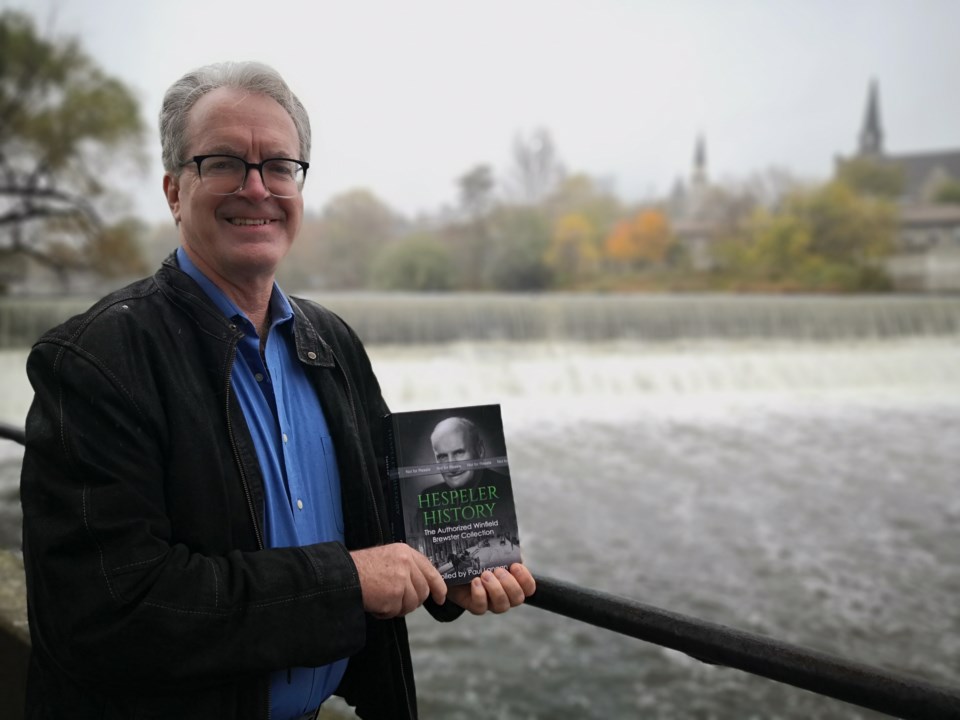The pandemic may have left some people wondering how to kill time but local history author Paul Langan knew exactly how he would use this slow time.
“I got a chance to look at the things in my cupboard that I'd collected over the years,” he said, talking about the material that makes up two of the six books he is releasing this year.
The first one is about a history of the former Town of Hespeler, which was amalgamated with Cambridge in the ‘70s, said Langan.
It took him about 15 years to get permission from the descendants of the Winfield Brewster to share the records Winfield and his son had collected while working as the town’s treasurer. Both had been an integral part of the community otherwise, too, said Langan
“It's not my history,” he said. “I just compiled it and collected it.”
To make it relevant to people now, Langan said, he put in photos showing a then and now comparison.
“Bob Falle has the largest (private) collection of Hespeler historical memorabilia,” he said. “He allowed me to use some of the items from his collection.”
There is a puiblicly-owned collection that is larger.
Langan said it’s important for people to connect with history as time passes.
He said he wants readers to enjoy and understand the rich history of the Hespeler community.
“I hope we can educate people and hopefully put up some kind of debate when a developer wants to come by and steamroll everything,” Langan said, referencing a dove cote that has become a point of significance in a development application around the Forbes Estate.
It’s documented by in the ‘50s in the Brewster records, he said, now there’s no debate about it.
Langan, who moved to the Hespeler area in 1994 and has been writing books documenting local and national history on and off for the last 22 years, said he likes the process of putting together a book.
When he first came to this part of Cambridge, the rich historical past of Hespeler impressed him, he said. In his attempts at saving the Hespeler train station, Langan said he got immersed in the history of the area.
“The best thing I like is the research and capture of history,” he said. “I'm cognizant as I get older that if you miss the oral history, and in fact the written history can be easily gone also if nobody preserves it, it's gone.”
That was how he felt when he wrote the book on the history of opera in the area.
“There had been a 100 years of opera in the region and nobody had captured and certainly it was on the verge of nobody capturing it,” said Langan. “Some of the people that were helping me with that book are grateful because now we've captured it.”
The biggest significance for Cambridge is making people aware of the history of that aspect of entertainment in the area, he said.
“We had a beautiful opera house at the south end of town and it was a major stop for performers at the turn of century coming through,” Langan said. “A lot of things in history are very Kitchener-Waterloo centric, so this book is a good example of how it wasn't all up there.”
Tales of Opera – Waterloo County/Region 1885–2020 captures opera in the area, he said, ending with Vera Cosa Opera Company’s production of the Little Red Riding Hood in Cambridge in 2020.
“Certainly, it's not all happy endings,” he said. “Most of these (opera) companies didn't fare well. The money it takes to put these things on is huge, so no matter what decade you look at things ended financially badly. It was neat and hopefully I've brought it to life so people in the area can enjoy it.”
Langan said his favourite aspect of the book was the effort it took to put on the productions.
“Fifty or 60 people would get on a train, come here to take part in a performance, the sets would be brought down by wagon and then the performers would get back on the train and go to the next town,” he said.
That's how they did it and that's how they made a living,” said Langan.
“It's just hard to conceptualize it now,” he said.
Now that the books have been published, Langan said, “I feel great about it because if somebody, a student or somebody in the community, has an interest in the topic, there's the book.”
The books are available at Wordsworth Books in Waterloo and online via Langan’s website: paullangan.com.



